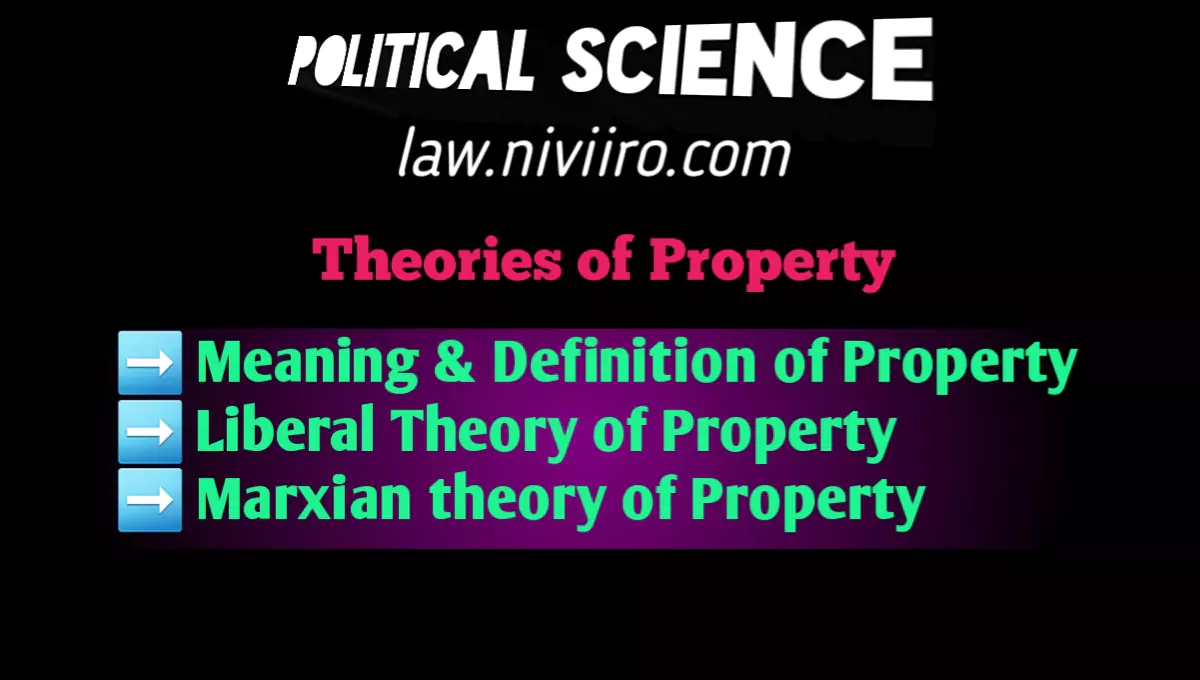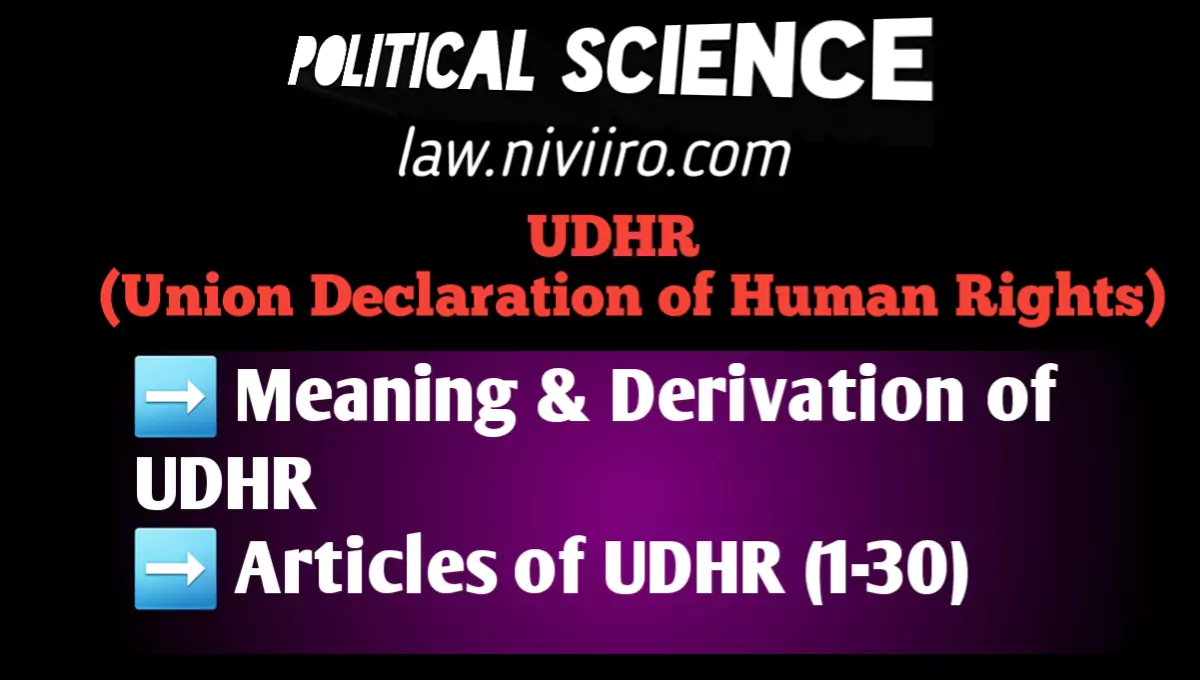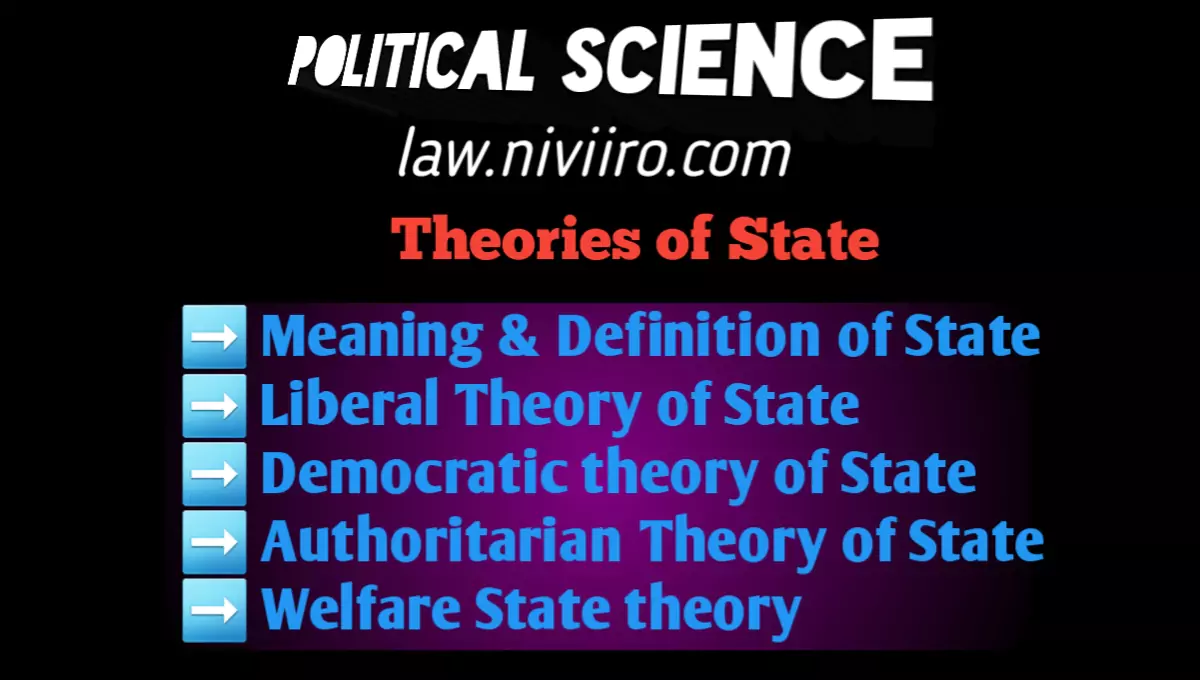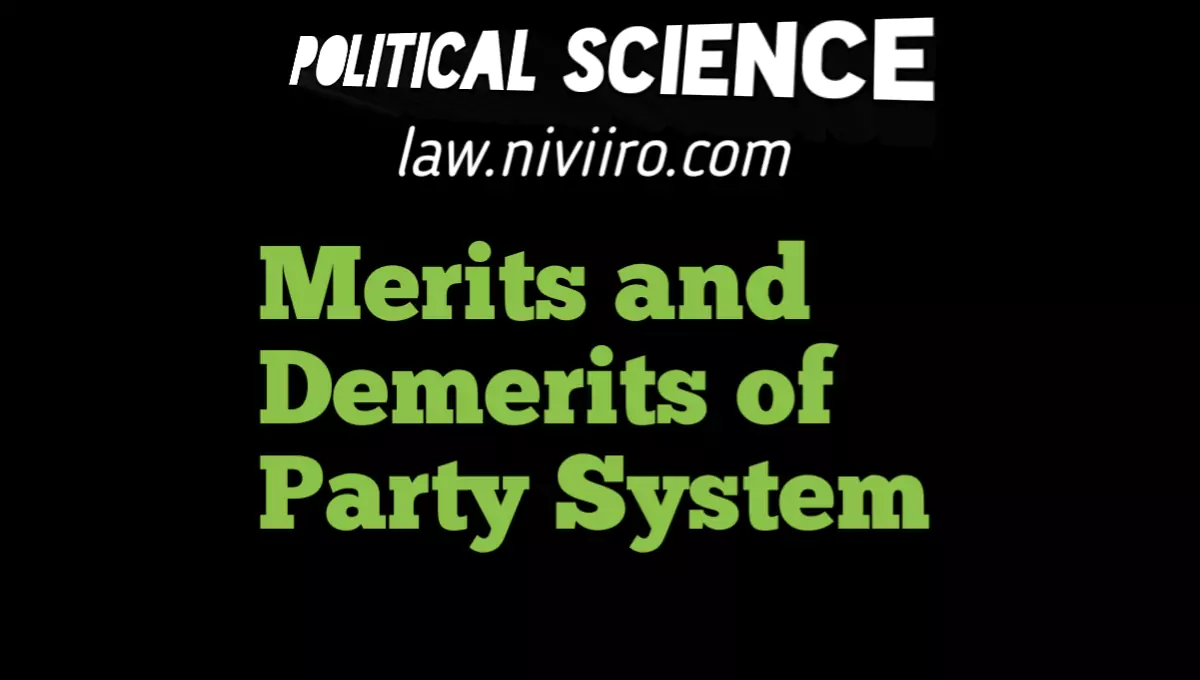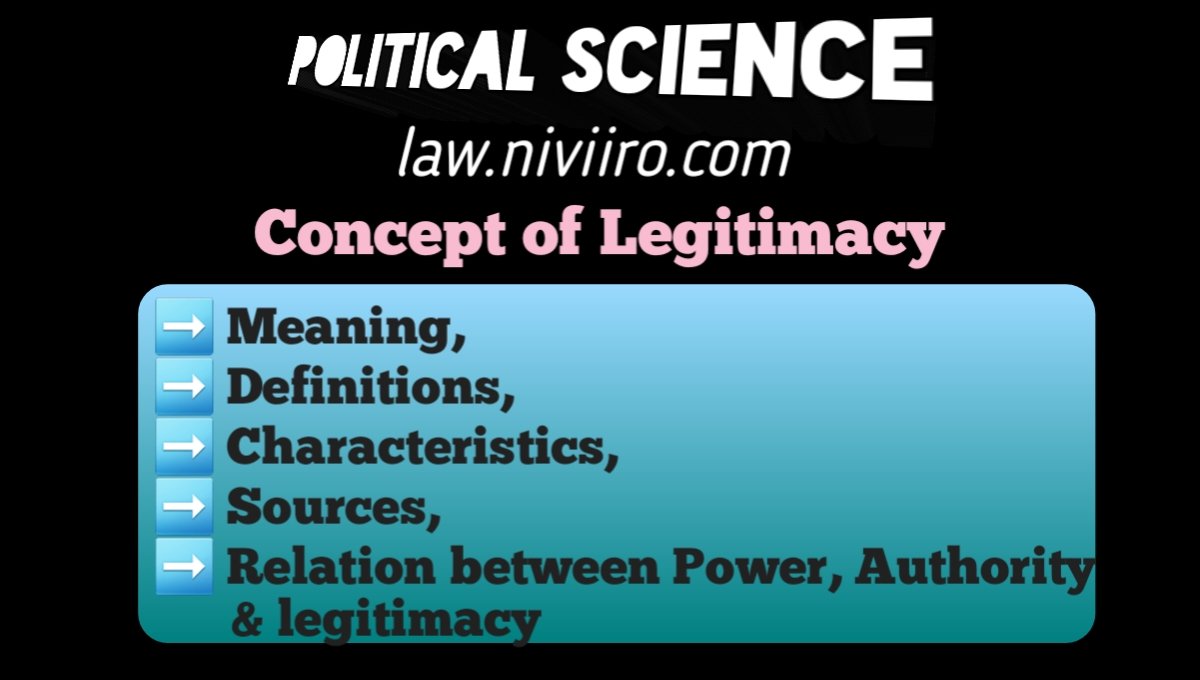Theories of Property – In political science, the legal identification and preservation of resource ownership, including physical property (such as land and tangible items) and intellectual property, is referred to as property (such as patents, trademarks, and copyrights).
The word “Property” is derived from the Latin word “propriettem,” which meaning “ownership.” It stems ultimately from the Latin word “proprius,” which meaning “one’s own.” The term “property” in English refers to something that is owned, such as a plot of land or a building. It can also refer to a property or characteristic that something possesses, such as a substance’s properties in chemistry or a mathematical object’s properties in mathematics.
Meaning & Definition of Peoperty
Section 2 (11) of the Sales of Goods Act of 1930 states that “property” refers to any possession, whether movable or immovable, tangible or intangible, including rights and personal interests.
Political science authors have tackled the idea of property from a variety of angles. Here are a few illustrations:
According to Karl Marx, a philosopher and economist from the 19th century, property is a social relationship that is influenced by a society’s method of production. He believed that in capitalist countries, the working class is exploited as a result of a tiny class of capitalists controlling the means of production (such factories and land).
English philosopher John Locke argued that individuals have inherent rights to life, liberty, and property and that it is the responsibility of the government to protect these rights. According to Locke, Individuals have the right to acquire and hold property by their own effort, as well as the right to give it away or sell it to others.
An economist and social reformer named Henry George argued that since the community creates the value of land, the community should have the right to tax that value. He believed that doing this would lessen poverty and make wealth distribution more egalitarian.
According to American philosopher Robert Nozick, who lived in the 20th century, the state’s function should be restricted to defending people’s fundamental rights to own and possess property. He argued in the past that the state shouldn’t redistribute money or resources since doing so would go against people’s property rights.
Liberal Theory of Property
Liberal theory of property generally holds that individuals have a natural right to own and control private property. This right is often seen as being essential to the protection of individual liberty and the ability to pursue one’s own interests and goals. According to liberal theory, private property serves as a foundation for a market economy, in which individuals are free to produce, exchange, and consumer goods and services as they see fit.
Liberal theory of property also emphasizes the importance of the rule of law and the protection of property rights through a legal system that enforces contracts and resolves disputes. This legal framework is seen as essential for promoting economic development and facilitating the peaceful resolution of conflicts.
Liberal theory of property is often contrasted with Marxist theory, which views private property as a means of exploitation and advocates for the collective ownership of the means of production. However, liberal theory of property also allows for the possibility of state regulation of private property in certain circumstances, such as in the case of externalities or negative impacts on third parties.
Arguments in Favour of Liberal Theory
Several arguments in favor for the liberal theory of property are frequently advanced:
- Property rights protect individual liberty: According to liberal ideology, private property is a crucial element of human liberty since it enables people to manage and dispose of their own goods however they see appropriate. Property rights preserve individual liberty. This might be viewed as a means of preserving people’s freedom of choice and autonomy.
- Property rights facilitate economic development: according to the liberal theory of property, a market economy based on private property is the most effective and efficient method to structure economic activity. Private property may promote greater wealth and economic progress by giving people incentives to produce and innovate.
- Property rights promote social stability: Social stability can also be enhanced by a system of private property since it establishes a clear and predictable framework for resource ownership and usage. Conflicts and tensions over the possession and control of resources may be lessened as a result.
- Property rights are vital for the rule of law: According to liberal philosophy, maintaining the rule of law and a fair and just society both depend on the legal protection of property rights. People can be treated fairly and depend on the predictability of the law if there is a legal system that respects and upholds property rights.
Arguments in Against of Liberal Theory
There are also several arguments that are often put forward against liberal theory of property:
- Property rights can lead to inequality: There may be huge income and power discrepancies as a result of property rights, to some, with a tiny minority controlling the majority of resources and the economy. As a result, social and economic inequality may develop, undermining the idea of equality.
- Private property rights may clash with other principles: Principles like the public good or environmental preservation may be in contradiction with private property rights. In such circumstances, it may be argued that the preservation of property rights is more important than these other principles.
- Property rights can be used to oppress: The preservation of property rights has frequently been used to legitimise the oppression of marginalised groups, such as indigenous peoples and slaves, according to critics of the liberal theory of property. Property rights have been utilised in these instances to justify the exploitation and eviction of these populations.
- Property rights may not be natural: Some contend that rather than being a natural or inherent right, the concept of natural property rights is a social construct that has been developed and enforced by the state. This point of view contends that rather than being a matter of nature or a universal concept, the protection of property rights ultimately depends on political and legal authority.
Marxian Theory of Property
According to Marxian theory, property is a social relationship that arises as a result of the production and reproduction of commodities. Marx asserts that the private ownership of the means of production, which are utilised to derive profit from the sale of goods made using wage labour, is a distinctive feature of the capitalist mode of production. The exploitation of the working class by the owners of the means of production is the foundation of the production relations in capitalist society.
According to Marx, the concentration of wealth and power in the hands of a tiny class of capitalists results from private ownership of the means of production, while the vast majority of people are reduced to the status of wage workers who must sell their labour power in order to subsist.
Marx believed that the only way to eliminate this unequal income and power distribution is to abolish private property and build a socialist society in which the means of production are collectively owned and controlled. This is a crucial component of Marx’s criticism of capitalism.
Arguments in Favour of Marxian Theory
Some arguments that are often put forward in favor of Marxian theory of property include:
- Property rights perpetuate exploitation: Marxist theory holds that private ownership of the means of production permits a tiny number of capitalists to benefit from the labour of the working class. This perpetuates exploitation. This exploitation is recognised as a crucial contributor to social and economic inequality and as a core aspect of capitalism society.
- Property rights hinder economic development: Some Marxists contend that the pursuit of profit results in waste, overproduction, and environmental damage, making a market economy based on private property inherently inefficient and prone to crises. Socialism is an alternative form of economics that is based on community ownership of the means of production and is seen to be more effective at addressing societal demands.
- Property rights stifle creativity and innovation: Marxist theory asserts that private ownership of the means of production encourages people to focus on their own limited self-interest rather than advancing the interests of society as a whole, which stifles creativity and innovation. Socialist regimes, which operate under the tenet of “from each according to their abilities, to each according to their needs,” are thought to be more supportive of innovation and creativity.
- Property rights contribute to social conflict: The concentration of wealth and power in the hands of a tiny class of capitalists is seen by Marxist theory as a major cause of social conflict and class struggle. It is asserted that these issues may be settled and a more peaceful society can be produced by doing away with private property and implementing a socialist government.
Arguments in Against of Marxian Theory
Several objections to the Marxist idea of property are listed below:
- Private property is a fundamental right: Some people argue that the right to possess and control private property is a basic human right. This right should be safeguarded. They contend that the Marxist theory of property, which opposes private property, would be in violation of this right and would be detrimental to human freedom and autonomy.
- Socialism has not been successful in practice: Critics of the Marxist theory of property argue that socialist nations have not been effective in achieving more equality and prosperity. As proof that socialism is not a workable economic and political system, they cite instances of socialist regimes that have encountered economic stagnation, political repression, and other issues.
- The forced confiscation of private property is a violation of individual rights: Some detractors claim that the nationalisation of the means of production advocated by the Marxist theory of property would necessitate the forcible confiscation of private property, which would be a violation of people’s rights.
- The Marxist ideology is overly deterministic: according to some detractors, who claim that it forbids people from exercising their own free will and influencing the social, economic, and political structures that govern their lives. They contend that this viewpoint minimises the complexity and diversity of the human experience and reduces people to being simple tools of more powerful political and economic forces.
- The Marxist theory of property is too closely associated to authoritarian and oppressive governments: some individuals have outright rejected the idea since it has been linked to such governments in the past. They contend that the ideology has been employed to justify restricting personal freedom and consolidating power in the hands of a select few elites.
- Class conflict is central to the Marxist theory of property: Class conflict is central to the Marxist theory of property because it posits that the bourgeoisie (the capitalist class) and the proletariat (the working class) are locked in a struggle over the distribution of wealth and resources. According to Marx, the bourgeoisie use their ownership of the means of production (such as factories and land) to extract surplus value from the proletariat, who are forced to sell their labor in order to survive. This class conflict is seen as a driving force behind social and political change, as the proletariat seeks to overthrow the bourgeoisie and create a more equitable society.
Recognising the Difference between Public and Private Property
According to the Marxist theory of property, the ownership and control arrangements of public and private property are what distinguish them most from one another.
Persons or groups of individuals own and manage private property for their own personal gain. This might include personal property owned by private people or businesses, such as a car or a house, as well as businesses and other types of real estate. On the other hand, public property is owned and managed by the state or the government on behalf of the general populace. This can apply to infrastructure such as public transportation systems, educational facilities, and other amenities.
The capitalist mode of production, in which a tiny class of capitalists owns and controls the means of production (such as factories and land) and derives surplus value from the working class, is seen under the Marxist theory of property as being linked to private property. Public property, on the other hand, is viewed as a means of resolving the unequal distribution of income and resources that results from capitalism.
Marx argued that a socialist society would result in a more fair distribution of income and resources after the nationalisation of the means of production. While some Marxists contend that private property may be outlawed in a communist society, others think that socialism and a reform of private property could coexist.
Conclusion
We looked at two different theories of property: 1) liberal theory 2) Marxian theory
Each theory has advantages and drawbacks of its own. Liberal theory is based on the idea of free market forces and promotes personal growth. Marxian theory, on the other hand, seeks to uphold social justice and the level of equilibrium in society. It is challenging to draw a firm judgement on which theory of property is best because both the liberal and Marxian theories have advantages and disadvantages. It is now up to us to decide which theory should be used, or, to put it another way, whether private property should be allowed or not.
The liberal theory’s emphasis on the value of human freedom and autonomy, as well as its view of property as a basic right that the state protects, are among its strong points. This viewpoint enables the growth of a thriving market economy where individuals are free to acquire, trade, and own resources in accordance with their own interests and beliefs. Liberal philosophy, though, is not without flaws.
One critique is that it does not adequately take into account the ways in which social and economic forces may influence how wealth and resources are distributed, thereby failing to alleviate inequality and poverty.
The Marxian approach, on the other hand, has the advantage of understanding the social and economic forces that influence resource ownership and control. Additionally, it asks for the development of a society with more equitable distribution of resources and income. The Marxian hypothesis, however, also has several drawbacks. One critique is that it does not adequately discuss how the state shapes property rights and may as a result undervalue the value of laws and regulations in promoting a just and fair society. Additionally, some people have expressed doubt against the concept of doing away with private property and establishing a socialist society, claiming that such a system would be unpleasant or impossible.
In the current world, the majority of nations are welfare states. They make sure that there are plenty of opportunities for citizens to improve themselves. In a welfare state, liberal theory will be more applicable. People will own property, raising their standard of living, and the state will see to it that everyone is treated equally and justifiably.
Due to the creation of the welfare state, much of the Marxist criticism was rendered ineffective. Second, if you examine Marx’s theory, you will discover that the lower class also lacks opportunities for advancement. Furthermore, they are denied access to private property. With little money and resources, living standards cannot be raised. Because the underclass can also advance on their own, liberal theory works better in a welfare state.
Related Post
- Theories of rights
- Constituent elements of the
- Meaning of Duties | Types – Political Science
- Distinction Between the State and Government – Political Science
- State-meaning,definition,derivation & elements
- Political Science- Meaning, definition, nature & scope
- Distinction between State and Society – Polictical Scie
1. What is property?
Section 2 (11) of the Sales of Goods Act of 1930 states that “property” refers to any possession, whether movable or immovable, tangible or intangible, including rights and personal interests.
2. What do you understand by liberal theory of property?
The liberal theory of property is a theoretical perspective that explains the moral and legal norms that should guide a society’s ownership and management of resources. Individuals have an inherent right to possess and control property, and the job of government is to protect and facilitate this right. According to the liberal concept of property, Property rights are fundamental aspect aspect of personal freedom and liberty, and should be protected and maintained by the state.
3. What do you understand by Marxist theory of property?
The Marxist theory of property is a political and economic theory that emphasises the concept that property, especially land, wealth, and capital, should be possessed and controlled collectively rather than individually by the community or the state. According to this concept…
4. What are the basic differences between public and private property?
There are basic differences between public and private property which are as follows:-
a. Private property is owned and controlled by individuals or private entities, whereas public property is owned and controlled by the government or the community as a whole….
5. What role does property plays in an individual’s life?
Property is important in a person’s life because it may bring security, stability, and a sense of ownership and control. Property may also be used to produce income and wealth since it can be rented or sold for a profit. Furthermore, property may be used to create….
References
- M.P. Jain, Political Theory liberal and Marxiam
- Prof. S.L. Verma, Modern Political Theory
- R.C. Agarwal, Political Theory
- Prof. H.C. Verma, Modern Political Theory
- J.C. Johari, Political Science
- V.D. Mahajan, Political Theory













